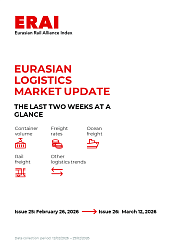T.H.I. Railway Business Unit and TopRail were both guests in the first official China edition of RailFreight Live last Friday. The forwarding companies have vast experience in booking space on the train from China to Europe or the other way around. Of course, each of the platform companies has its own requirements, but there are certain things that a customer should know, agreed Will Kong (T.H.I.) and Alison (Toprail) in an interesting conversation with show host Huilin Shi (RailFreight.cn).
Text continues below the video
Tip #1: Have eastbound volumes
If you have considerable eastbound volumes, you are more likely to get space on the train going west, both forwarders firmly put. This has everything to do with the continuing imbalance between volumes going from China to Europe (westbound) and Europe to China (eastbound).
Since the very beginning, the eastbound volumes have been lower. «The situation is more balanced now, but it is still much harder to get a booking space on a westbound train than on an eastbound train», said Will. Therefore, customers with cargo destined for China are welcomed with open hands by the platform company and, hence, by the forwarding company.
Tip #2: Have e-commerce
The forwarders also unanimously agreed that e-commerce is prioritised over general cargo. So, if you have e-commerce cargo that you want to put on a train, you are very likely to succeed even if you are a new customer.
The forwarding company is not the only one prioritising E-commerce. The Chinese government has attached great importance to the industry, which entails all that bought or sold online. E-commerce has specifically surged since the pandemic, as shopping opportunities have been, and in some countries still are, limited. Therefore, goods purchased online are more likely to have a spot on the train than other cargo, explained Alison.
Tip #3: Book all-year-round
Rail freight traffic between Europe and China fluctuates depending on the season. There are several peak seasons, such as Christmas and the period before the Spring Festival, and off-seasons. The best example of the latter is Spring Festival itself, which is the most important Chinese holiday when production is at an all-time low.
As it is challenging to deal with these fluctuations, companies like T.H.I. appreciate those customers who book space on the train all-year-round. «Those customers that support the industry in off-seasons are more likely to get a spot on the train in high season. The same applies to platform companies. Forwarders that have bookings all-year-round will have easier access to the train», explains Will.
Tip #4: Book in advance
According to Alison, it may not always be possible, but it is better to book in advance. «At Toprail, we currently work on a first-come, first-serve basis», she says. «We cannot respond to all the requests at the moment due to the extremely high demand. But we do not prioritise existing customers or the highest bidder. So it is the first-come, first-serve principle we apply.»
Booking far in advance also allows Alison to understand her customer’s needs better, she explains. «If I understand their schedule and know what other shipments they have planned, I can take this into account and offer the best solution possible.»
Tip #5: Be a long-term customer
This may be a bit more difficult when you just entered the market, but long-term customers tend to have their privileges, although not to the same extent, extend with all forwarders and platform companies. Whereas Alison says that this is more in their understanding of the procedures, Will admits that existing customers do get prioritised over new customers.
«We reserve 70-80 per cent of our capacity for our existing customers because these are the customers that stay with us all-year-round. This is how we maintain long-term relationships», he explains. «The remaining 20-30 per cent is for new customers.»
Not enough space
Ironically, the rail freight industry has been advocating for a shift to rail for many years, and, positively, this shift has been observed during the pandemic, when ocean shipping prices have surged tremendously. «A lot more people have come to rail lately, but because of that, our capacity on the westbound train is limited. Consequently, we currently cannot fulfil the demand», says Will.
Alison observes the same. «This is fueled by the fact that countries like India and Vietnam are still in the middle of the corona crisis. Production is still limited here, which means more pressure on China as an export country than usual. We are trying the best we can, but we cannot answer all booking requests.»
End of the tunnel
According to the forwarders, this situation is not likely to improve this year. However, Will is the most optimistic among the two and looks at spring 2022 as a turning point. «Q3 and Q4 are high seasons, but February and March are off-seasons for the whole international logistics industry. This could be a turning point when shipping prices drop and the availability of containers increases.
But if you ask Alison, even spring would be too soon for the market to recover. According to her, the world still has a long way to go in recovering from the pandemic. «There are still many places in the world where COVID is playing a role. Until at least 70-80 per cent of the world population is vaccinated, the market will not return to normal. I think this return to normal will be sometime in Q3-Q4 of 2022.»
Part II China edition
Are you curious about the perspective of the platform company when it comes to the availability of booking space? This Friday, the second part of the China edition will be broadcast. This time, we will hear from Zhang Xiao from the Xi’an International Inland Port Multimodal Transportation Corporation. The show will be visible on our YouTube Channel from Friday 18 June, 1 pm CEST.





